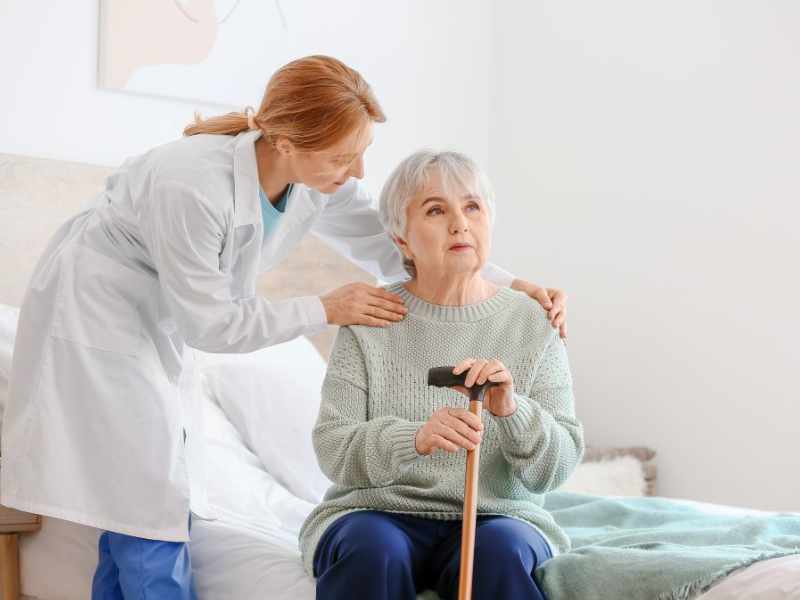 In Home Neurological Care
In Home Neurological Care
Los Angeles | Orange County | San Diego | San Francisco
Kinkaid Private Nursing Care offers premium neurological care in the comfort and privacy of your home. As no two individuals require the same care plan, we customize each patient’s care by aligning your needs with a professional and clinically-led team of private care nurses.
At Kinkaid, we offer at-home care for the following neurological disorders (discussed in detail later on this page):
- Multiple Sclerosis (MS)
- Amyotrophic Lateral Sclerosis (ALS)
- Parkinson’s Disease
- Traumatic Brain Injury (TBI)
What is Neurological Care?
Neurological care refers to the care one receives while managing a neurological condition. Neurological care will not cure a disease; rather, it aims to provide comfort, manage pain from symptoms, and reduce the stress and anxiety that can accompany various neurological disorders.
Neurological Conditions Treated at Home by Kinkaid
As mentioned above, we work with patients diagnosed with one of four different neurological disorders. In this section, we define each disorder and discuss some of the symptoms associated with each. Please keep in mind that while there is no cure for any of the following diseases, neurological care can help manage symptoms and improve the overall quality of life for patients diagnosed with them.
Multiple Sclerosis (MS)
MS is a disabling disease that affects the brain and spinal cord. With MS, the immune system affects the protective sheath around nerve fibers, which disrupts communication between the brain and the rest of the body. Symptoms of MS can vary depending on the severity of each case. While some patients may lose the ability to walk, others may only experience minor symptoms. The following is a list of some of the most common symptoms of MS:
-
- Movement-related symptoms, including trouble walking, weakness in limbs, lack of coordination, and electric shock sensations in the neck
- Vision-related symptoms, including partial or complete loss of vision and/or blurry or double vision
- Fatigue or dizziness
- Slurred speech
- Sexual, bowel, and bladder-related problems
- Tingling and/or pain in parts of the body
Amyotrophic Lateral Sclerosis (ALS)
ALS is a progressive neurodegenerative disease that attacks nerve cells in the spinal cord and brain, which prevents the body’s muscles from receiving the nourishment they need to function. Individuals diagnosed with ALS typically have a lifespan of 2-5 years. The main symptoms of ALS revolve around the progressive loss of muscle control. Individuals with ALS slowly lose the ability to do the following on their own:
- Eat and drink
- Speak
- Move
- Grab objects
- Breathe
Parkinson’s Disease
Parkinson’s disease is a neurodegenerative disorder that mostly affects neurons that produce dopamine, which is a chemical the nervous system uses to send signals between nerve cells. Low dopamine levels in the body can lead to a lack of control over basic motor functions, such as walking and general movement, among other things. The following are some of the most common symptoms of Parkinson’s Disease:
- Movement-related symptoms, including trouble moving or walking, stooped posture, drooling, dizziness or fainting, and more
- Anxiety, depression, and/or stress
- Breathing difficulties
- Fatigue or trouble sleeping
- General pain or discomfort
- Hallucinations and/or delusions
- Memory problems, including dementia
Traumatic Brain Injury (TBI)
TBI, sometimes referred to as craniocerebral trauma, refers to a brain dysfunction caused by an outside source. Examples of outside sources include concussions, blows to the head, or something related. Two of the most common causes of TBI are car accidents and severe sports injuries. The following are some of the most common symptoms associated with TBI:
- Cognitive-related symptoms, including trouble speaking and understanding language, amnesia, mental confusion, trouble concentrating, and more
- Behavioral-related symptoms, including aggression, impulsivity, lack of restraint, abnormal laughing or crying, and more
- Issues with anger, anxiety, and/or loneliness
- Fatigue, dizziness, and/or fainting
Contact us for a FREE consultation today!
What Does Kinkaid’s Neurological Care Look Like?
Kinkaid’s team of experienced and highly trained nurses provides premium in-home care to all our patients. Our nurses possess decades of experience caring for patients with neurological disorders and successfully providing them with a heightened sense of comfort and a higher quality of life. And while we customize our care to meet the unique needs of each patient, we prioritize the following aspects of our care for all patients to ensure you receive the benefits of our in-home neurological care:
- Reducing Stress and Anxiety: Because our care is provided 100 percent at home, you never have to deal with the stress of traveling or with crowded hospitals or doctor’s offices. Moreover, our nurses are trained to use your familiar surroundings to increase comfort and reduce anxiety even further.
- Pain Management: One important aspect of neurological care is managing any pain that may come with the disease. Our nurses are highly trained and possess decades of experience in pain management.
- Keeping Families Together: Having your loved ones readily available at home is beneficial while dealing with a neurological disorder. By remaining at home, you never have to leave your family and can lean on them for support whenever necessary.
- Reducing the Need for Hospitalization: Our nurses are trained to monitor and stabilize patients at home, reducing the likelihood of needing to check into a hospital or facility.
- Increasing Privacy: Not only do you receive premium care, but you also experience a maximum level of privacy, as you will not have to check into a crowded hospital, doctor’s office, or treatment center.
- Individualized Care: While treatment centers may not have the resources to customize care for each patient, Kinkaid’s care is one-on-one and customized to meet your exact needs.
- Administering Medication Appropriately: Ensuring that our patients receive the medication they need and at the right time is crucial for their health and comfort. Because of this, our nurses are trained in administering medication safely and effectively.
- Excellent Communication with Patients and Families: Good communication is key for anything, especially for handling something as complicated as neurological care. We prioritize communication with our patients and their families to ensure everyone is on the same page and that our patients receive everything they need in a timely and effective manner.
WHO PROVIDES OUR CARE?
Our care is provided by Kinkaid’s team of in-home nurses with decades of experience in neurological care. Our nurses are trained to provide high-quality in-home care in a kind and professional manner, while also ensuring excellent communication with families.
Neurological Care Coverage Areas
We service patients in California.
In-Home Nursing Care Services for Neurological Conditions:
Parkinson’s | Multiple Sclerosis (MS) | Amyotrophic Lateral Sclerosis (ALS) | Parkinson’s Disease | Traumatic Brain Injury (TBI)
Our in-home nursing services throughout the state of California, including:
LOS ANGELES METRO AREA:
- Home Nursing Care Bel Air
- Home Nursing Care Beverly Crest
- Home Nursing Care Beverly Grove
- Home Nursing Care Beverly Hills
- Home Nursing Care Beverlywood
- Home Nursing Care Brentwood
- Home Nursing Care Century City
- Home Nursing Care Cheviot Hills
- Home Nursing Care Culver City
- Home Nursing Care Hidden Hills
- Home Nursing Care Holmby Hills
- Home Nursing Care Ladera Heights
- Home Nursing Care Los Angeles
- Home Nursing Care Malibu
- Home Nursing Care Mar Vista
- Home Nursing Care Marina Del Rey
- Home Nursing Care Pacific Palisades
- Home Nursing Care Palms
- Home Nursing Care Pasadena
- Home Nursing Care Pico Robertson
- Home Nursing Care Playa Vista
- Home Nursing Care Santa Monica
- Home Nursing Care Sawtelle
- Home Nursing Care Venice
- Home Nursing Care West LA
- Home Nursing Westwood
ORANGE COUNTY:
- Home Nursing Chino Hills
- Home Nursing Costa Mesa
- Home Nursing Dana Point
- Home Nursing Huntington Beach
- Home Nursing Irvine
- Home Nursing Laguna Beach
- Home Nursing Laguna Hills
- Home Nursing Laguna Niguel
- Home Nursing Mission Viejo
- Home Nursing Newport Beach
- Home Nursing Newport Coast
- Home Nursing Orange County
- Home Nursing San Clemente
- Home Nursing San Juan Capistrano
- Home Nursing Yorba Linda
SAN DIEGO METRO AREA:
- Home Nursing Carlsbad
- Home Nursing Chula Vista
- Home Nursing Coronado
- Home Nursing Del Mar
- Home Nursing Eastlake
- Home Nursing Escondido
- Home Nursing Hillcrest
- Home Nursing La Jolla
- Home Nursing Oceanside
- Home Nursing San Diego
SAN FRANCISCO
- Home Nursing Alameda
- Home Nursing Berkeley
- Home Nursing Daly City
- Home Nursing Mountain View
- Home Nursing Oakland
- Home Nursing Palo Alto
- Home Nursing Richmond
- Home Nursing San Francisco
- Home Nursing San Rafael
- Home Nursing Walnut Creek



